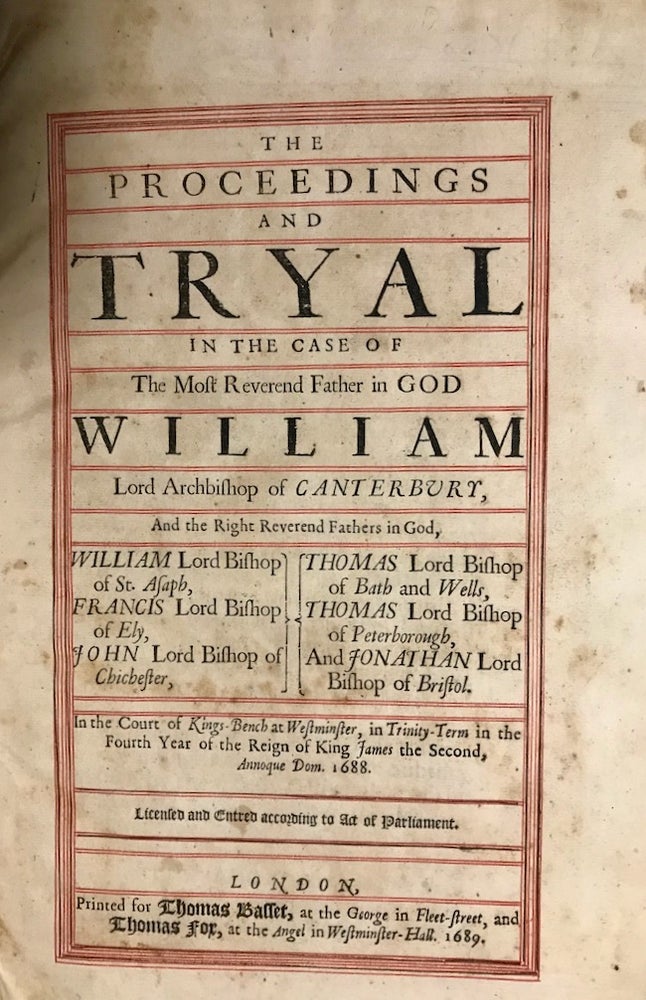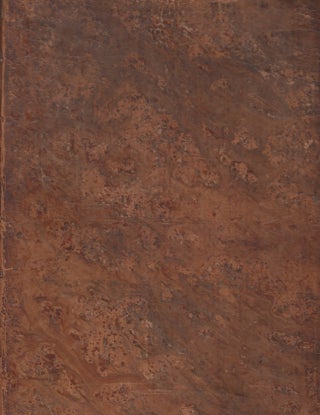The Proceedings and Tryal in the Case of the Most Reverend Father God William Lord Archbishop of Canterbury, and the Right Reverend Fathers in God, William Lord Bishop of St. Asaph, Francis Lord Bishop of Ely, John Lord Bishop of Chichester, Thomas Lord Bishop of Bath and Wells, Thomas Lord Bishop of Peterborough, And Jonathan Lord Bishop of Bristol.
In the Court of Kings-Bench at Westminster, in Trinity-Term in the Fourth Year of the Reign of King James the Second, Annoque Dom. 1688. Licensed and Entered according to Act of Parliament London: Printed for Thomas Basset, at the George in Fleet-Street, and Thomas Fox, at the Angel in Westminster-Hall. 1689.
First Edition. Full calf. Folio. [3], 140 pages. [MISSING THE ENGRAVED FRONTISPIECE] Marbled calf leather binding with leather title label on the spine. Outer joints for both boards are cracked and the boards are loose but still attached. Text is outlined in red horizontal and vertical printed lines. Armorial bookplate of "Hans Sloane Stanley" located on the front paste down. Sir Jonathan Trelawny (Bishop of Bristol), William Lloyd (Bishop of St. Asaph), William Sancroft (Bishop of Canterbury) was three of the Bishops on trial for seditious libel under King James II. Fair. Item #23599
From wikipedia:
Sir Jonathan Trelawny, 3rd Baronet (24 March 1650 – 19 July 1721) was a British Bishop of Bristol, Bishop of Exeter and Bishop of Winchester. Trelawny is best known for his role in the events leading up to the Glorious Revolution which are sometimes believed to be referenced in the Cornish anthem The Song of the Western Men. He was born at Trelawne in the parish of Pelynt, Cornwall, the eldest surviving son of Sir Jonathan Trelawny, 2nd Baronet. He was educated at Westminster School and then went to Christ Church, Oxford at the start of the Michaelmas term of 1668 where he distinguished himself as a scholar.
A staunch royalist, he was ordained in 1673 and became a beneficed clergyman. He was appointed rector of South Hill on 4 October and of St. Ives on 12 December 1677, becoming Bishop of Bristol in 1685. He was one of the Seven Bishops tried for seditious libel under James II. Trelawny and the other bishops petitioned against James II's Declaration of Indulgence in 1687 and 1688, (granting religious tolerance to Catholics) and as a result he was arrested and imprisoned in the Tower of London on charges of seditious libel. The bishops said that whilst they were loyal to King James II, their consciences would not agree to allowing freedom of worship to Catholics even if it were to be within the privacy of their own homes as the Declaration proposed; thus they could not sign. Trelawny was held for three weeks before trial, then tried and acquitted; this led to great celebrations, with bells being rung in his home parish of Pelynt.[1]
William Lloyd was born at Tilehurst in Berkshire, in 1627, the son of Richard Lloyd, then vicar,[1] who was the son of David Lloyd of Henblas, Anglesey. By the age of eleven, he had understanding in Greek and Latin, and somewhat of Hebrew, before attending Oriel and Jesus Colleges, Oxford (later becoming a Fellow of Jesus College).[2] He graduated M.A. in 1646. In 1663 he was prebendary of Ripon, in 1667 prebendary of Salisbury, in 1668 archdeacon of Merioneth, in 1672 dean of Bangor and prebendary of St Paul's, London, in 1680 bishop of St Asaph, in 1689 lord-almoner, in 1692 bishop of Lichfield and Coventry, and in 1699 bishop of Worcester.[3] As Bishop of Lichfield he rebuilt the diocesan residence at Eccleshall Castle, which had been destroyed in the Civil War.[4]
Lloyd was an indefatigable opponent of the Roman Catholic tendencies of James II of England, and was one of the seven bishops who, for refusing to have the Declaration of Indulgence read in his diocese, was charged with publishing a seditious libel against the king.[3] However he was acquitted in 1688, which was one of the events that lead to the fall of James II.[citation needed]
He engaged Gilbert Burnet to write The History of the Reformation of the Church of England and provided him with much material. He was a good scholar and a keen student of biblical apocalyptic literature and himself "prophesied" to Anne, Queen of Great Britain, Robert Harley, 1st Earl of Oxford and Mortimer, William Whiston, and John Evelyn the diarist. Lloyd was a staunch supporter of the Glorious Revolution.[3]
He lived to the age of ninety-one and died at Hartlebury Castle on 30 August 1717. He was buried in the church of Fladbury, near Evesham in Worcestershire, of which his son was rector and where a monument is erected to his memory with a long inscription.[5]
William Sancroft (30 January 1617 – 24 November 1693) was the 79th Archbishop of Canterbury,[2] and was one of the Seven Bishops imprisoned in 1688 for seditious libel against King James II, over his opposition to the king's Declaration of Indulgence. Deprived of his office in 1690 for refusing to swear allegiance to William and Mary, he later enabled and supported the consecration of new nonjuring bishops leading to the nonjuring schism.
Price: $300.00




